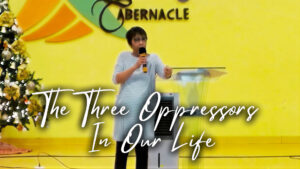GENESIS 48: 1- 6, 14- 20
1 Now it came to pass after these things that Joseph was told, “Indeed your father is sick”; and he took with him his two sons, Manasseh and Ephraim. 2 And Jacob was told, “Look, your son Joseph is coming to you”; and Israel strengthened himself and sat up on the bed.
3 Then Jacob said to Joseph: “God Almighty appeared to me at Luz in the land of Canaan and blessed me, 4 and said to me, ‘Behold, I will make you fruitful and multiply you, and I will make of you a multitude of people, and give this land to your descendants after you as an everlasting possession.’ 5 And now your two sons, Ephraim and Manasseh, who were born to you in the land of Egypt before I came to you in Egypt, are mine; as Reuben and Simeon, they shall be mine. 6 Your offspring whom you beget after them shall be yours; they will be called by the name of their brothers in their inheritance.
14 Then Israel stretched out his right hand and laid it on Ephraim’s head, who was the younger, and his left hand on Manasseh’s head, guiding his hands knowingly, for Manasseh was the firstborn.
15 And he blessed Joseph, and said:“God, before whom my fathers Abraham and Isaac walked,The God who has fed me all my life long to this day,16 The Angel who has redeemed me from all evil,Bless the lads;Let my name be named upon them,And the name of my fathers Abraham and Isaac;And let them grow into a multitude in the midst of the earth.”
17 Now when Joseph saw that his father laid his right hand on the head of Ephraim, it displeased him; so he took hold of his father’s hand to remove it from Ephraim’s head to Manasseh’s head. 18 And Joseph said to his father, “Not so, my father, for this one is the firstborn; put your right hand on his head.”
19 But his father refused and said, “I know, my son, I know. He also shall become a people, and he also shall be great; but truly his younger brother shall be greater than he, and his descendants shall become a multitude of nations.”
20 So he blessed them that day, saying, “By you Israel will bless, saying, ‘May God make you as Ephraim and as Manasseh!’ ” And thus he set Ephraim before Manasseh.
Intro:
The blessing of a father or patriarch carried tremendous weight and was seen as a transfer of authority, inheritance, and spiritual favor.
Genesis 48 is filled with significance for the future of the Israelite people. But with Jacob’s death rapidly approaching and as his eyes dim with age, he understands that there is still work to be done, a faithful act that he needs to perform as the patriarch of the people of God.As the covenant head of the people of God, he needs to pass on the blessing to the next generation.
God gave it to Abraham and said that it was for him and for his offspring. Isaac blessed Jacob with the blessing he himself had received. So Jacob summons his strength and sits up in bed to bless his grandsons-turned-sons with the blessing of God. And as he blesses each of his sons in chapter 49 his words are not mere wishful thinking, because he speaks as the head of the covenant people, the words are prophetic.
TITLE: THE CROSSING OF BLESSINGS
- The Hands of Blessing
- The Unexpected Crossing
- The Hand That Crossed Man’s Maneuvering
- THE HANDS OF BLESSING
Blessings signify inheritance.
Jacob blessed his sons. (ch.49)
- He speaks of land for Zebulun by the shores of the sea;
- Gad as a frontier tribe who will endure raids from outsiders but raid them in return;
- Asher dwelling in rich farmland that would bear food fit for a king
- There would be fruitfulness in the family of Naphtali,
- Fierceness and wisdom in the family of Benjamin,
- Pleasantness and some pain in the family of Issachar.
- Reuben, Simeon and Levi though they lost the preeminence and will be scattered among Israel, they still have a place in the covenant and a secure place in the Promised Land.
- And for Judah, the preeminence and the royal right to rule the people of God would belong to his family.
Blessings belong to the children.
Jacob owned Joseph’s children who were born in Egypt. He declared his adoption of them.
God must own you first. There must be a declaration of ownership or adoption.
The Bible is clear that all people are God’s creation (Colossians 1:16), and that God loves the entire world (John 3:16), but only those who are born again are children of God. John 1:12“But as many as received Him, to them He gave the right to become children of God, to those who believe in His name.”
In Scripture, the lost are never referred to as God’s children. Ephesians 2:3 tells us that before we were saved we were “by nature objects of wrath”.
We become God’s children when we are saved because we are adopted into God’s family through our relationship with Jesus Christ. Romans 8:14-17: “…because those who are led by the Spirit of God are sons of God. For you did not receive a spirit that makes you a slave again to fear, but you received the Spirit of sonship. And by him we cry, ‘Abba, Father.’ The Spirit himself testifies with our spirit that we are God’s children. Now if we are children, then we are heirs—heirs of God and co-heirs with Christ, if indeed we share in his sufferings in order that we may also share in his glory.”
Those who are saved are children “of God through faith in Christ Jesus” (Galatians 3:26) because God has “predestined us to be adopted as his sons through Jesus Christ, in accordance with his pleasure and will” (Ephesians 1:5).
Adoption made us God’s children.
E.g. Our modern law on inheritance.
Jacob laid his hands on Joseph’s sons.
The laying on of hand was a symbolical sign, by which the person acting transferred to another a spiritual good, a power or gift. It is the natural mode of marking out the object of the benediction, signifying its conveyance to the individual, and implying that it is laid upon him the destiny of his life.
The laying on of hand may be done by either hand; but when each is laid on a different object, it may denote that the higher blessing is conveyed by the right hand.
Old English word for “right,” = “riht,” which means: just, good, fair, proper, fitting, straight.
Figuratively speaking, most verses in the Bible consider the “right side” to be good and proper, and the left to be weak.
Jacob wanted to bless Joseph’s sons so they could receive a portion of the inheritance along with his own sons. So Joseph put Manasseh under Jacob’s right hand so that Manasseh would receive the greater blessing.
Sometimes God does the unexpected. It is not always God’s plan for the oldest to get the blessing.
II. THE UNEXPECTED CROSSING
Joseph was unhappy with Jacob crossing his hands.
Genesis 48: 17- 18Now when Joseph saw that his father laid his right hand on the head of Ephraim, it displeased him; so he took hold of his father’s hand to remove it from Ephraim’s head to Manasseh’s head. And Joseph said to his father, “Not so, my father, for this one is the firstborn; put your right hand on his head.”
Important Aspects.
- The Symbolism of the Right and Left hands.
The Bible presents the right hand as the hand of strength.
Exodus 15:6Thy right hand, O LORD, is become glorious in power: thy right hand, O LORD, hath dashed in pieces the enemy. Psalm 118:16 “The LORD’s right hand is lifted high; the LORD’s right hand has done mighty things!”
Sitting at someone’s right hand is considered a position of honor.
Psalm 110:1The LORD says to my Lord: “Sit at my right hand until I make your enemies a footstool for your feet.” The right hand is consistently valued over the left hand in Scripture.
A person of high rank who puts someone on his right hand gave him equal honor with himself and recognized him as possessing equal dignity. It is symbolic of ruler-ship, authority, sovereignty, blessing, and strength.
The right hand was associated with strength, blessing, and favor, while the left hand was often seen as inferior or used for less important tasks.
The act of crossing his hands is symbolic of the unexpected and unconventional nature of God’s blessings.
God’s favor and blessing do not always follow human traditions or norms but are based on His sovereign will and purpose.
- The Reversal of Societal Norms.
The firstborn son held special status and privileges, including the right to inherit a double portion of his father’s estate and the family leadership role. Israel intentionally places his right hand on the younger son. He is deliberately conferring greater blessing and leadership onto him, thereby breaking the traditional expectations and customs.
God’s ways are not always in line with human customs and traditions. God’s favor is not necessarily based on birth order, societal status, or human merit, but rather on His sovereign choice and purpose.
One commentator writes: Sometimes God chooses to bless that which we don’t expect Him to bless in our lives.
III. THE HAND THAT CROSSED MAN’S MANEUVERING.
Joseph maneuvered the situation. He put the firstborn in front of the grandfather’s right hand to receive the first blessing and the second in front of the left hand to receive the second blessing.
The first blessing is always more important than the second blessing. This happened to Jacob and Esau.
According to the natural concept, Joseph was right. However, Jacob crossed his hands.
E.g. Parents
E.g. Maneuvering in the church.
Our maneuvering does not correspond to God’s blessing.
Sometimes God will go out of his way to bless you in a way you were not expecting. Completely by grace – unearned and unmerited.
God has a track record of bypassing the world’s norms to release His blessing on His children. The blessing of the firstborn is a well-documented part of history. But God has overruled this practice many times in scripture.
Bible examples of reversal of blessing:
- God called Abraham instead of Haran.
- The greater blessing was not passed to Ishmael the older son of Abraham, but to Isaac.
- It was not the older son, Esau, but Jacob who got Isaac’s blessing.
- It was not Aaron but Moses who led Israel out of slavery.
- It was not Eliab who became God’s chosen king over Israel but David.
- It was not one of David’s older sons who took over his throne but Solomon.
In Genesis 48:15-16, Jacob blesses Joseph as he blesses the sons saying, “God, before whom my fathers Abraham and Isaac walked, The God who has fed me all my life long to this day, The Angel who has redeemed me from all evil, Bless the lads; Let my name be named upon them, And the name of my fathers Abraham and Isaac; And let them grow into a multitude in the midst of the earth.”
Jacob doesn’t bless the boys with his own blessing. He looks back over his life and asks the God of the Covenant, the God who has been with him wherever he has gone, the angel who had acted time and time again to rescue him – he asks God to bless the boys.
The two sons received essentially the same blessing with the same words spoken over them. But Ephraim, the younger one gets the right hand of Jacob – the greater blessing – instead of his older brother.
The blessing of God falls on those whom God wills, on those to whom He is pleased to give it, to His beloved children.
Application: God, in bestowing blessings upon his people, gives more to some than to others, more gifts, graces, and comforts, and more of the good things of this life. He often gives most to those that are least likely. He chooses the weak things of the world; he raises the poor out of the dust. Grace observes not the order of nature, nor does God prefer those whom we think fittest to be preferred, but as it pleases him.
CHRISTOCENTRIC:
Our assumptions about God make us doubt whether there is any blessing for us, any grace for people with besetting sins or weak faith or wandering hearts.
But God, through Jacob, speaks of how He works. Those who think they deserve it are passed over. And those who are unworthy – the small, the unimportant, even great sinners like you and me have become recipients of the greater blessing.
How does it happen? By having a place in God’s family. Jacob owned Ephraim and Manasseh. “And now your two sons, Ephraim and Manasseh, who were born to you in the land of Egypt before I came to you in Egypt, are mine; as Reuben and Simeon, they shall be mine.”
God has the hand of blessing. Ephraim received the double portion when His father Jacob stretched his hands and crossed them, placing his right hand on him. It was the right hand that represents strength, the right hand of position of honor and the right hand of dignity.
But God the Father did not even stretch His hand towards His own Son on the cross, instead a crown of thorns was laid on Jesus’ head. He was beaten and the soldiers stretched His hands and nailed them on the cross. Instead of strength Jesus experienced weakness, instead of honor He experienced shame and instead of dignity He experienced worthlessness. But it was those hands on the cross that caused us, the younger, the weaker, the small, the unworthy, the unimportant and even great sinners to be able to cross the blessing. And Jesus himself being the elder One gave His all to us.
On Mt. Calvary, we see Jesus, the greater Jacob, who stretched his hand on the cross to remove our curse and depravity and laid on us the eternal blessings.
And on the cross, our older brother Jesus, the better Manasseh gave up his rights for us so we could become the blessed Ephraim. He gave it willingly. He is the greater older brother who allowed himself to be bypassed of strength, honor and dignity so that the not-so-privileged “YOU”, may receive them.
Now He is seated at the right hand of God, He has power and glory over everything and has even given us the privilege to receive everything He has prepared for us.
CONCLUSION:
We need the hand of blessing. We need the blessing of the Father and the only way to have the blessing is by “adoption”. God’s judgment on His Son on the cross made us His adopted children.
The crossing of blessing is God’s judgment and discretion. He gives “To whom He is well pleased”. He already made Judgment through His own, His only begotten Son.
Those who think they deserve may not have but those who come lowly to Him receives His favor. This favor comes because of Jesus stretching His hands on the cross and what He did on the cross is the crossing of blessing for us. And it does not stop there, there is more because He is now seated at the right hand of God stretching His hands and touching our lives.





